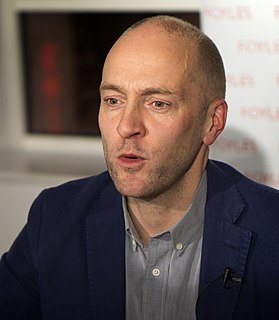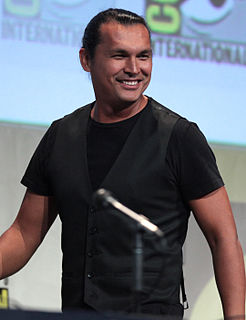Top 1200 Psychological Trauma Quotes & Sayings
Explore popular Psychological Trauma quotes.
Last updated on April 14, 2025.
I am not a psychological novelist, and I try very hard not to allow the reader to see the plight or circumstances of the characters as individual psychological plights. That's my preference; still, a lot of people do read my novels as psychological studies, and they're right to read them that way too, if that's what they mean to them.
We [Americans] have a historical trauma when it comes to the past relationships when it comes to Native Americans and the history of how America was created. With this film, it's nice to see that the trauma is presented from a white male that was in the Civil War and that trauma affects him in a way that still exists.
There are those uncomfortable things that've passed that you have to deal with or they define you, like childhood trauma. Like when I'm lost, I just feel like somewhere along the line, if you've gone through any childhood trauma, it makes you lose your essence and it takes a while to get that back. There are certain things about that that push my buttons.
I have come to the conclusion that human beings are born with an innate capacity to triumph over trauma. I believe not only that trauma is curable, but that the healing process can be a catalyst for profound awakening - a portal opening to emotional and genuine spiritual transformation. I have little doubt that as individuals, families, communities, and even nations, we have the capacity to learn how to heal and prevent much of the damage done by trauma. In so doing, we will significantly increase our ability to achieve both our individual and collective dreams.
We're painting the same people all our life - it's just the way we look at them that changes. If you experience trauma, you can speak about it in so many different ways. You can speak about landscape, you can speak about your food; it's always different. Trauma is the beginning of life as an artist.
I've seen people recover physical abilities, yet never get over emotional trauma after a serious accident. I've seen other people overcome the psychological and emotional trauma of a serious illness even though they may never fully regain their physical capabilities. Which is the greater healing? Which is the better recovery? If I had the option of choosing between a mediocre life with eyesight or the life I have today, even though I am blind, I'd stay blind and keep the life I have.
I believe that at the beginning of the life of every artist there is some kind of trauma. We have a problem and all of our life we try to speak about this problem. My trauma was historical. When I was three or four, all the friends of my parents were survivors of the Holocaust; they spoke a lot about that. My father was hiding during the war, it was something totally present when I was a boy. It is sure that it has made me.
I think trauma gets a reductive treatment. We tend to think only violence or molestation or total abandonment qualify as "childhood trauma," but there are so many ruptures and disturbances in childhood that imprint themselves on us. Attachment begets trauma, in that broader sense, and so if we've ever been dependent on anyone, I think there is an Imago blueprint in us somewhere.
At least I've had to come to that in my life, to realize that this stuff called failure, this stuff, this debris of historical trauma, family trauma, you know, stuff that can kill your spirit, is actually raw material to make things with and to build a bridge. You can use those materials to build a bridge over that which would destroy you.
If we take a hard look at what poverty is, its nature, it's not pretty - it's full of trauma. And we're able to accept trauma with certain groups, like with soldiers, for instance - we understand that they face trauma and that trauma can be connected to things like depression or acts of violence later on in life.
Since the attachment to the cult of Islam is psychological, the solution must also be psychological. We have all the logical proof that Islam is false. But logic has its limitation. Brainwashed people dismiss logic and pride themselves in their blind faith. Psychological warfare is extremely powerful. The Muslim bravado must be destroyed by humiliations and ridicule.
We have opted for petty determinisms - childhood trauma, genetic inheritance, social conditioning, etc. - that have made us comparatively passive. We seem to prefer to find excuses - which are really nothing more than the embrace of determinism, a sort of Stockholm syndrome relative to whatever we can claim as limitation. I am fascinated by the more enabling self-understanding. It has helped me to find my way out of the cloying comforts that are offered by prevalent psychological models.
We have the tendency to judge others by their surface appearance, and to find only their negative qualities. But if we search beneath the surface we discover that a myriad of strains mix together to create a particular person's nature. The faults we perceive are likely to be the effect of circumstances, the psychological response to trauma, abuse, rejection, heartbreak, insecurity, pain, confusion, or disease.
No doubt many people have the feeling that to talk about death at all is, in effect, to conjure it up mentally, to bring it closer in such a way that one has to face up to the inevitability of one's own eventual demise. So, to spare ourselves this psychological trauma, we decide just to try to avoid the topic as much as possible.
The thing that always interests me from a storytelling point of view is how that moment of trauma, whatever the trauma is, even divorce, your dog dies, whatever it is, the consequence, in terms of people's emotional lives and the way it resonates behaviorally for a long time is really the stuff that interests me.
The thing that always interests me from a storytelling point of view is how that moment of trauma, whatever the trauma is, even divorce, your dog dies, whatever it is, the consequence, in terms of people's emotional lives and the way it resonates behaviorally for a long time, is really the stuff that interests me.



















































